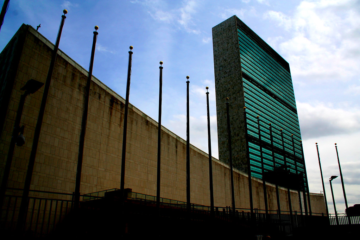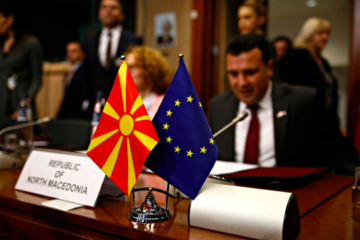While eternal winter was engulfing the north of the continent in snow, a subtle fight has broken out in Germany. The battle is all about an iron throne: the throne of the iron chancellor who has ruled Germany for more than twelve years.
Her tenure is slowly but steadily coming to an end. The next three-and-a-half years are widely expected to be Angela Merkel’s last in office. Whoever manages to position themselves in the front row of German politics, will have a good chance of replacing her as party leader of the centre-right Christian Democrats (CDU) and then as a chancellor. Serious contenders from other parties are not in sight.
Accordingly, the now finalised process of forming a new government with the Social Democrats (SPD), has sparked an unusually public debate on Merkel’s succession. Securing a ministerial post or party office will be vital for potential candidates to present themselves to the electorate. The allocation of government offices in the last weeks was thus accompanied by numerous demands.
Merkel’s troublesome last months fuelled the fierceness of the debate. They included a weak election result, failure to strike a coalition agreement with the Greens and Liberals and the loss of the ministry of finance to the new (and old) coalition partner SPD. The lack of success left the iron chancellor no longer untouchable.

“We need more young faces in government if we want to talk about Germany’s future”, the leader of the party’s youth organisation, Paul Ziemiak, urged. Ziemiak is associated with a young generation of economically liberal and socially conservative CDU politicians, such as Carsten Linnemann and Mike Mohring. Their goal is to re-emphasise the CDU’s conservative character. For long, Merkel’s rather centrist policies have been tolerated by this part of the party. But facing competition from the right-wing populist party AfD and the end of Merkel’s rule, traditionalists see their chance.
Their champion is 37 years old, gay, and a chat-show regular: Jens Spahn, an MP from Berlin. Nominally, he is an expert on health policy, who has not yet held any important offices. In recent years though, Spahn has risen to prominence with his views on immigration and Islam, whereby he addresses favourite topics of German conservatives.
“Burqa and niqab certainly don’t belong to Germany,” he declared in an article. Furthermore, he denounces homophobia among Muslims, and complains about “elitist” Berlin hipsters, who only speak English. Spahn also criticised failure to address and act upon worries among the population about Merkel’s decision to allow thousands of refugees to cross the border to Germany in the late summer of 2015.
Despite that, he will take office as health minister, as was confirmed when Merkel disclosed the CDU’s ministers for the upcoming government on 25 February.
The new cabinet also sees Julia Klöckner being promoted to the head of the Ministry for Food and Agriculture. Yet the leader of the CDU in the state of Rhineland-Palatinate can also be regarded as part of the young conservative upheaval. Like Spahn, she has criticised Islamic patriarchy and published a manifesto outlining an alternative to Merkel’s open-door refugee policy.
Klöckner has been tipped as a potential successor to Merkel. But being responsible for two defeats in a row in regional elections has considerably weakened her position. Due to her popularity with the party base, her prospects should yet not be underestimated.
Do these promotions mean that Merkel is giving in to a conservative revolution in her party? Quite the opposite, for the most salient revelation in personnel matters has been her recent nomination of a new general secretary for the party.
Her pick is barely known abroad but deemed Merkel’s personal favourite to follow on her: Annegret Kramp-Karrenbauer. Previously, the 55-year old has served successfully as Minister-President of the small state (Bundesland) of Saarland.
The office of a general secretary with no governmental responsibility is nominally a downgrade. But the job can also kick-start a career. It was not least Merkel herself who went on from general secretary to party leader and finally Chancellor.
Publicly, Kramp-Karrenbauer has obviously denied any big ambitions. Yet Merkel’s plan seems clear: as a general secretary, her ally will manage the daily business of the party and represent it in public. Such, she will get to know the CDU and help shape it for the future. Moreover, she will be able to individuate herself at the national level. Conversely, the chancellor exposes her adversary Spahn to a difficult task at the Ministry of Health. He will also have to hold back with public criticism as cabinet members are conventionally required to support government policies.
As a chancellor, “AKK”, as Kramp-Karrenbauer is nicknamed, would clearly stand for continuity. Like Merkel, she is known for a pragmatic style of politics. But she also knows how to make a conservative mark : for example, she outspokenly rejected same-sex marriage, demanded age checks for underage refugees, and banned campaign appearances of Turkish ministers in Saarland. Hopes are high that she can reconcile Merkel-like pragmatism with the traditional roots of the CDU.
Indeed, Kramp-Karrenbauer’s appointment has been applauded by both conservatives and liberals. She was elected as general secretary with the highest result ever. In a poll among party members in which they were asked about the suitability of potential leaders, she gathered most approval–before Klöckner and Spahn.

Whether the general secretary manages to translate her momentum into becoming the next chancellor will depend on her performance over the course of the next term. But it also depends on Merkel’s. Willingness to back continuity might be greater, if the chancellor finishes her tenure successfully. Should she run into new policy controversies similar to the 2015 refugee crisis, proponents of a clear cut turn back towards conservatism could get the upper hand.
Not to mention the remaining potential candidates with an outside chance, such as the Merkel-loyal Minister-President of Schleswig-Holstein, Daniel Günther, or defence minister Ursula von der Leyden. The game of thrones has just begun.


